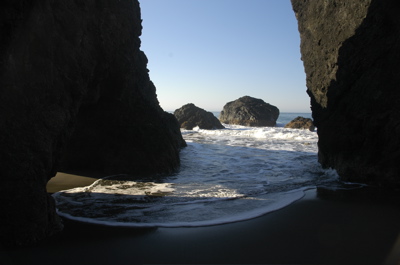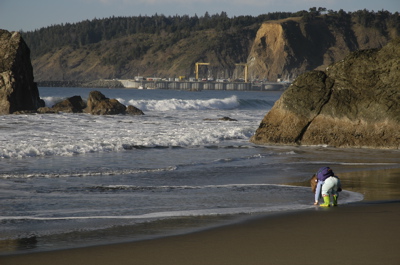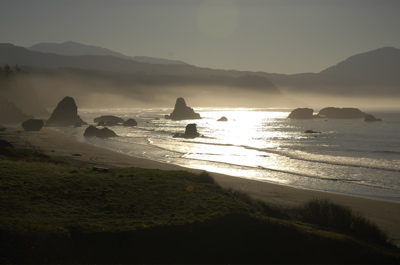It was a wonderful day driving down the last leg of the Oregon coast on Sunday. We started off again in the beach near Port Orford, so Emma could hunt for sea stars and we could all get in a good long walk before getting in the car. The tide was higher and we didn’t see the starfish but the beach itself was fascinating, soft brown sand tumbled with giant rocks.

In the background, the unusual port of Orford. They don’t have a sheltered harbor, so each boat that comes in is lifted by a crane to a giant concrete pier and stored on top.

We deliberately left ourselves only about 90 miles of driving so we could once again stop off anywhere that seemed interesting. That was a good strategy once again, as the Oregon coast is strewn with beautiful scenes and amazing vistas.

We stopped for lunch in the town of Brookings, and visited the local seafood shops for some red snapper and Cajun spiced salmon. Those prizes went in the fridge for later. I remember thinking that the Airstream made a nice foreground for the Hwy 101 bridge behind us, with the sun reflecting off the Airstream’s skin and brilliant blue skies above “¦ and I thought “I’ll snap a picture of that after lunch.”
Whoops. I had forgotten the famous Pacific coast fog, which sneaks in and turns warm sunny days into grey cold ones in minutes. Sure enough, during lunch I looked out the window and the photo was gone. Heck, even the bridge was gone!
By the end of the day we pulled into Jedediah Smith State Park and set up amongst the towering redwood trees. This campground dates (as so many state campgrounds do) from around 1930, and so the roads are narrow and the sites are small. A site which is claimed to fit a 30-foot trailer does ““ but not much else. Still, the reward is sleeping with a 500-700 year-old redwood tree on either side of your bed. I wouldn’t want to see a single tree harmed so I could have an easier time parking!

Emma is impressed by old-growth redwoods but not as much as we are. To her, they are merely big trees. She doesn’t see how rare they are (only 4% of the historic territory of the Pacific Redwood still exists), and she doesn’t recognize how tenuous their existence is. They grow only one place in the world: the Pacific coast, below 2000 feet and near the foggy damp air. And there are only a few hundred acres of them left, 45% of which is national and state parkland in northern California.

A redwood is one of the living things closest to immortality. They resist diseases, insects, earthquakes, and fires. In fact, they thrive on the occasional fire, using it as inspiration to reproduce. The oldest ones have been growing for 2,000 years. How can you stand amidst these immortals and not be humbled? To them, we are just a blip in their centuries-long lives. Someday Emma will appreciate their message. I will show her the picture of her standing in the middle of three redwoods and suggest that she find them again with her children.

